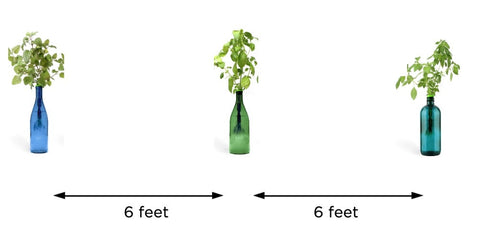The global pandemic that has recently turned our world upside down, has had a profound effect on our economy, our mental health, our lives and…perhaps the environment. While the coronavirus is clearly not something to celebrate, there is a curious and perhaps positive side effect to this worldwide social distancing.
The quickly spreading virus has closed schools, restricted travel, emptied grocery store shelves, and affected over 100,000 people. The actions and precautions that governments, schools, and businesses have taken to keep people home are helping to save lives, which is clearly the most important element. But could this social isolation also help reduce greenhouse gas production, and end up having an unexpected consequence for climate change?
It’s looking that way. The question is, will it stick?
So let’s take a look at how social distancing has had an impact on climate change, and some resulting positive habits we can potentially take away to further these indirect benefits?
Here are a few ways we’ve seen a change in greenhouse gas emissions due to the coronavirus:
Reductions in Transportation
Because of the lockdown people are driving and flying less. This has a huge impact on our climate pollution. To put it in perspective: “one round-trip flight from New York to London produces as much greenhouse gas emissions as the preventive climate impact of nearly eight years of recycling,” says Dr. Kimberly Nicholas, a researcher at the Lund University Center for Sustainability Studies. However, this drop in emissions does depend on where you live and whether you drive 2 hours every day on your commute to and from work, or take public transportation.

This has made a particularly large impact in China, the world’s largest contributor to climate change. Based on this article from the NY Times, the severe reduction in air travel in China has led to a significant drop in greenhouse gas emissions. Elizabeth Economy, a China expert at the Council on Foreign Relations, says that this “drop in industrial production, manufacturing, and automobile use will produce a noticeable drop in CO2 emissions for at least the first two months of the year.” Because there is less air pollution in China, reporters say that carbon emissions, air pollution, and nitrogen pollutants are down significantly.
Food?
When it comes to the carbon footprint of eating out versus eating at home, the results are fuzzy and not clear enough to say one or the other. We do waste about 25% percent of the food that we buy, however on the other hand, we could be saving on fuel by not driving long distances to get to our favorite bars and restaurants. Something to keep in mind is that eating plants over animal products is one of the biggest ways you can lower your carbon footprint. So now is the time for gardening, using your resources, and eating what you have on hand, like the copious amounts of rice and beans you bought in a panic when this all began!

Shopping
There have been two huge changes in shopping behavior since our world went under lockdown; 1) we are buying much less ‘stuff’ than we normally do, and 2) the ‘stuff’ we do buy is more likely to have been purchased online.
Online vs Brick-and-Mortar shopping and their respective climate impacts is a hotly debated topic, and the truth is that the question of which is better for the planet depends on a huge number of variables, including things like trip-chaining (how many stops we make on a shopping trip), return rates, express shipping (this is TERRIBLE for the environment, btw), number of items purchased, etc.
The clearer impact when it comes to shopping behavior is that most of us are just buying a lot less ‘stuff’ than we used to. And that’s a good thing. Experts say that it would take 2.5 – 3 Planet Earths for us to support our current behavior into perpetuity, so the fact that we only have 1 Planet Earth means that we are consuming, as a population, more than what our planet is able to sustain long term. There are only 2 ways to solve this: 1) we create 2 new Planet Earths and send a bunch of people there, or 2) we all stay where we are on this Earth and we just start consuming less.
Obviously, some forms of shopping, like for food, are essential. One of the best ways to reduce your food-footprint is to consume locally. Now is a great time to sign up for your local CSA (Community Supported Agriculture) and receive fresh fruits and vegetables that have not had to travel a long way to get to you! Here’s some more tips on reducing your foot-footprint.
Behavioral Changes
While this pandemic has been an incredible blow to people world wide, the indirect benefit of social distancing and staying at home on climate change, and our overall health, is important and interesting to note. Thousands of Americans are spending more time gardening, and cooking at home (I mean, just look at the empty grocery shelves). When we are spending more time engaged with our food, be it cooking, gardening, spending more time shopping and picking out our ingredients, we are more likely to make healthy and sustainable food choices. During this time of COVID-19, CSA subscriptions have sky-rocketed which is huge for climate change. When you are eating locally, you’re contributing to your community’s economy and also decreasing carbon emissions. Furthermore, When people have control over their own food, they can eliminate ingredients like added sugars and fats. This, in turn, creates a healthier public.

The question is, will this last? Charles Duhigg, the author of “The Power of Habit” and a former New York Times reporter, notes that habits built over a lifetime are hard to shake. Even ones that have been severely disrupted. “As soon as the environment becomes stable again, the habit starts to reassert itself” unless there is a ‘powerful reward’ to the new behavior. Perhaps this ‘powerful reward’ is the prospect of shifting our current climate crisis, and reverse climate change. What can we do to continue practicing some of these habits that have come about during this time of crisis? Let is start with mindfulness and simply spending more time connected with yourself, your food, and the world around you.











There are no comments for this article. Be the first one to leave a message!